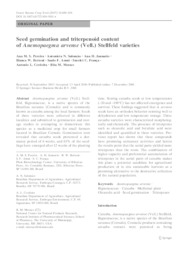Seed germination and triterpenoid content of Anemopaegma arvense (Vell.) Stellfeld varieties.
Seed germination and triterpenoid content of Anemopaegma arvense (Vell.) Stellfeld varieties.
Author(s): PEREIRA, A. M. S.; SALOMAO, A. N.; JANUARIO, A. H.; BERTONI, B. W.; AMUI, S. F.; FRANÇA, S. C.; CERDEIRA, A. L.; MORAES, R. M.
Summary: Anemopaegma arvense (Vell.) Stellfeld, Bignoniaceae, is a native species of the Brazilian savanna (Cerrado) and is commonly known as catuaba among the local farmers. Seeds of three varieties were collected in different localities and submitted to germination and storage studies in attempting to domesticate this species as a medicinal crop for small farmers located in Brazilian Cerrado. Germination tests revealed that catuaba seeds presented a dormancy period of 6 weeks, and 63% of the seedlings have emerged after 12 weeks of the planting time. Storing catuaba seeds at low temperatures (?20 and ?196C) has not affected emergence and survival. These findings suggested that A. arvense seeds have an orthodox behavior resisting well to dehydration and low temperature storage. Three catuaba varieties were characterized morphologically and chemically. The presence of triterpenes such as oleanolic acid and betulinic acid were identified and quantified in these varieties. Previous report has shown that these compounds have promising anticancer activities and herein the results point that the aerial parts yielded more triterpenes than the roots. The combination of higher capacity and preferential accumulation of triterpenes in the aerial parts of catuaba makes this plant a potential candidate for agricultural production or in situ sustainable harvests as a promising alternative to the destructive collection of the natural population.
Publication year: 2006
Types of publication: Journal article
Observation
Some of Embrapa's publications are published as ePub files. To read them, use or download one of the following free software options to your computer or mobile device. Android: Google Play Books; IOS: iBooks; Windows and Linux: Calibre.
Access other publications
Access the Agricultural Research Database (BDPA) to consult Embrapa's full library collection and records.
Visit Embrapa Bookstore to purchase books and other publications sold by Embrapa.

